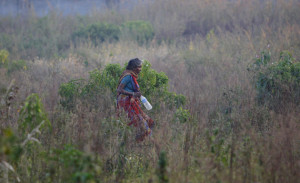Joseph Erbentraut ~ Groups Bring 10,000 Affordable Toilets To Rural India So Women Can Relieve Themselves Safely

An Indian woman walks in a field after relieving herself in the open, on World Toilet Day on the outskirts of Jammu, India, Wednesday, Nov. 19, 2014. U.N. figures show of India’s 1.2 billion people, 665 million, mostly those in the countryside, don’t have access to a private toilet or latrine, something taken for granted in developed nations. Some villages have public bathrooms, but many women avoid using them because they are usually in a state of disrepair and because men often hang around and harass the women. (AP Photo/Channi Anand)
For many women in poor, rural parts of the world, a lack of access to a private toilet is not just a matter of inconvenience, it also puts her at risk of diseases, sexual assault and ridicule.
But in the poverty-stricken Bihar region of India, a unique partnership between non-governmental organizations and the Bill and Melinda Gates Foundation has resulted in the construction of 10,000 new toilets allowing women to relieve themselves in a more secure and healthy way.
To kick off the project, Population Services International, a global network of locally-based groups, worked with partners including PATH, a global health organization, and Water for People, a water access group, in order to design a toilet that low-income people in the area would be able to buy and install in their homes.